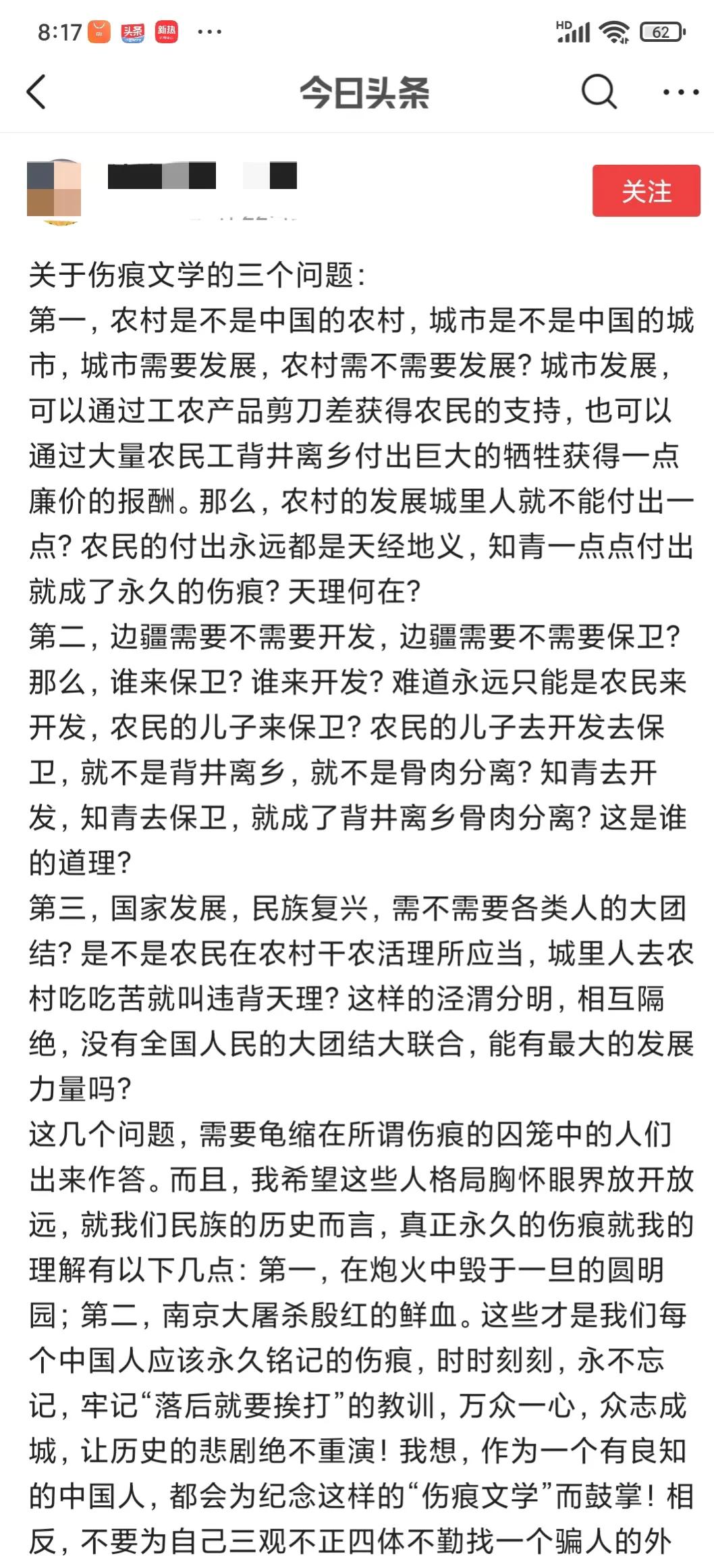Also speaking scar literature
Recently, with the popularity of the TV series "The World" based on Liang Xiaosheng's novel of the same name, scar literature, which once dominated the Chinese literary scene, suddenly became hot again. But this time, unlike the last time, critics clearly have the upper hand.
The starting point of scar literature was the end of the Cultural Revolution, and as the trend of emancipating the mind, pulling out chaos, and seeking truth from facts was gradually established in Chinese thought, a huge historical change also began to take shape, and the Chinese literary circles were also obliged to stand up first and act as the promoters of historical changes. In 1977, the second year after the end of the Cultural Revolution, literary works reflecting on the decade of turmoil began to appear in major domestic heavyweight publications, such as Liu Xinwu's "Class Teacher" published in people's literature, which was the opening work of scar literature and aroused strong resonance in the whole society. However, at that time, many literary critics called this literary phenomenon "reflective literature", some more radical literary critics called it "exposé literature", and later collectively called it "exposed literature". In essence, "scar literature" is "Cultural Revolution literature", but the name is a bit inappropriate, until 1978 Lu Xinhua's short story "Scars" was published, the literary circle felt that it had found a more appropriate name "scar literature". "Scars" has also become the crowning work of scar literature. After the Third Plenary Session of the Eleventh Central Committee at the end of 1978 and China established a policy of internal reform and opening up to the outside world, there was a spurt of scar literature, and the scar literature team gradually took shape and developed and grew. However, the scar literature of this period is still in the category of reflection on the Cultural Revolution, and the problems exposed are still very superficial and simple, and the political color is strong, far from touching the deeper things of thought. Until the emergence of "Zhiqing Literature" and "Return to the City Literature", and gradually incorporated by scar literature, scar literature seems to have become the mainstream literature of Chinese literature.
However, because scar literature only stays in the reflection and exposure of the Cultural Revolution, the inclusiveness of thought is limited, and the promotion of reform and opening up is limited, which is also a very pure side of scar literature, therefore, scar literature is like a flash in the pan, leaving only a faint skim in the great river of Chinese literature, disappearing like a meteor.
When the topic of scar literature is revisited today, many critics are bitter about scar literature, and they have listed a lot of ridiculous crimes for scar literature. Scar literature is at best only a literary trend of thought in a historical period, that is, it cannot influence the development of history nor change the development of history, because it has a narrowness that is difficult to overcome, and it is also doomed to its short-lived nature.
This morning I saw an article criticizing scar literature, titled three questions about scar literature, which gave scar literature three major looks, and it was very difficult for people to feel that they wanted to add to the guilt and have no excuse. The first question is, why can't the urban people bear the burden for the country, why can't the zhiqing bear the burden, and what is the natural reason? This question is no less than a thunderbolt on a sunny day! The second question is that if the peasant's son can go to the frontier to defend the border, and zhiqing can develop the frontier to protect the border, it will become the separation of flesh and bones from the background of the hometown. This question is also loud and deafening! The third question is whether peasants should work in the countryside, and urban people who go to the countryside to work are called contrary to heavenly reason, ❓ which may make many people landless. Of course, there is no way to verify who the author is asking these three questions, if it is a rebuke to scar literature, it is too serious about scar literature, scar literature is dead, are you summoning a soul for it? In the end, although the author will write the positive energy of the great unity and unity of the people, and use the Garden Mingyuan and the Nanjing Massacre as the literary positioning of the scars, it is inevitable that it is a bit untrue. Don't get me wrong, I just want to say that scar literature is a product of a specific historical period, just a literary concept of literary ideological trends, and we must not use the small concept of scar literature to steal the heroic and indomitable glorious history of the Chinese nation for more than a hundred years of resistance to aggression and struggle for national independence and national freedom.
